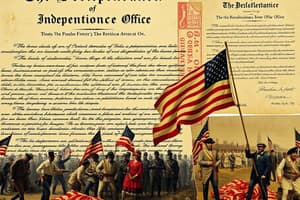Podcast
Questions and Answers
In general, why was the Declaration of Independence written?
In general, why was the Declaration of Independence written?
The Declaration of Independence was written so the thirteen colonies could declare that they were free from Britain and an independent country.
What basic rights does the document claim individuals have?
What basic rights does the document claim individuals have?
All men are created equal, we all were born with unalienable rights, including life, liberty, and the pursuit of happiness.
According to the document, why do the colonists have the right to declare independence?
According to the document, why do the colonists have the right to declare independence?
Because the king has refused to assent to laws necessary for the public good, making it their right and duty to throw off such government.
According to the colonists, how has the King responded to their grievances?
According to the colonists, how has the King responded to their grievances?
What risks did the colonists take by writing the Declaration of Independence?
What risks did the colonists take by writing the Declaration of Independence?
What colonial actions were omitted from the Declaration of Independence?
What colonial actions were omitted from the Declaration of Independence?
What was the purpose of the Declaration of Independence?
What was the purpose of the Declaration of Independence?
What is the Declaration of Independence?
What is the Declaration of Independence?
What is a traitor?
What is a traitor?
What is a preamble?
What is a preamble?
From whose point of view was the Declaration of Independence written?
From whose point of view was the Declaration of Independence written?
What are natural rights?
What are natural rights?
Who was Richard Henry Lee?
Who was Richard Henry Lee?
Who was Robert Livingston?
Who was Robert Livingston?
Who is Roger Sherman?
Who is Roger Sherman?
What is allegiance?
What is allegiance?
What is to impoverish?
What is to impoverish?
What is a ruffian?
What is a ruffian?
What is a resolution?
What is a resolution?
What is to redress?
What is to redress?
Flashcards are hidden until you start studying
Study Notes
Declaration of Independence Overview
- The Declaration was a formal statement asserting the thirteen colonies' freedom from British rule and their status as an independent nation.
- It was adopted in 1776 during the American Revolutionary War.
Fundamental Rights
- Asserts that all men are created equal and possess unalienable rights including life, liberty, and the pursuit of happiness.
Justification for Independence
- Colonists had the right to declare independence due to the king's refusal to enact necessary laws for public good.
- They believed it was both their right and duty to replace a government that did not serve them.
Colonial Grievances
- Colonists claimed that the king's response to their grievances was consistent injury and neglect.
Risks Involved
- Signing the Declaration put the signers at risk of treason; the king could punish them severely.
- The implications of the document were significant, affecting all colonies represented by the signers.
Omitted Issues
- Issues like the abolition of the slave trade and women's rights were excluded from the Declaration due to disagreements among representatives.
Significance of the Declaration
- It served as the first official claim to independence from British rule, laying the foundation for future governance and rights claims.
- Continues to be referenced in discussions about freedom and rights.
Definition and Traits
- The Declaration is defined as a 1776 document announcing the colonies' independence.
- A "traitor" is someone who betrays their country.
- A "preamble" serves as the introduction to official documents.
Perspective
- The Declaration reflects the perspective of the colonists and their representatives.
Natural Rights Concept
- Natural rights are considered inherent to all individuals from birth, emphasizing the idea of universal rights.
Key Figures
- Richard Henry Lee was a significant American statesman who advocated for independence.
- Robert Livingston contributed to drafting the Declaration and served in the Continental Congress.
- Roger Sherman was a draftee of both the Declaration and later the U.S. Constitution, representing a foundational figure in American governance.
Additional Terms
- "Allegiance" represents loyalty towards a monarch or government.
- To "impoverish" means to make someone poor.
- A "ruffian" is characterized as a bully or aggressive individual.
- A "resolution" is a formal expression of intent voted on by a group.
- To "redress" means to correct a grievance or complaint.
- A notable passage from "Common Sense" reflects on the king's priorities over justly engaging in war and governance.
Studying That Suits You
Use AI to generate personalized quizzes and flashcards to suit your learning preferences.




